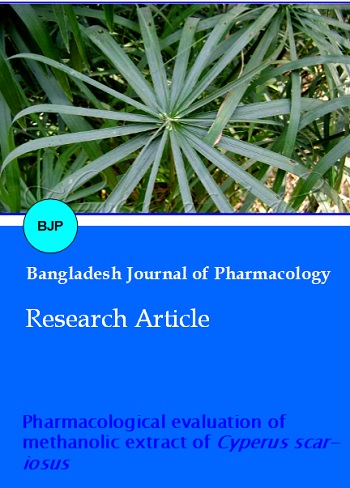Pharmacological evaluation of methanolic extract of Cyperus scariosus
DOI:
https://doi.org/10.3329/bjp.v11i2.23611Keywords:
Anti-oxidant, Cyperus scariosusAbstract
The present study is aimed to investigate the phytochemical screening and biological activities of methanolic extract of Cyperus scariosus roots. Dried plant was grounded and extracted with methanol to prepare methanol crud extract. In vitro biological tests were conducted using this methanolic extracts according to the standard procedure. 100% death rate of brine shrimp was perceived at 3 mg/mL of plant extract after 72 hours. The extract showed action against Aspergillus flavius i.e. 90% followed by A. niger (91%) while the highest activity was shown against A. fumegatrus (94%). Important scavenging results were detected during scavenging of free radicals viz; 92.2% against DPPH, 82.2% to ABTS, 75.8% to hydrogen peroxide, 88.1% to ?-carotene, 86.1% to hydroxyl radical and 89.4% against phosphomolybdate at 3 mg/mL were obtained. The results obtained in this study point out that extract showed significant biological activities which might be due to the presence of bioactive constituents.
Downloads
492
392 Read
159

Published
How to Cite
Issue
Section
License
Authors who publish with this journal agree to the following terms:
- Authors retain copyright and grant the journal right of first publication with the work simultaneously licensed under a Creative Commons Attribution License that allows others to share the work with an acknowledgement of the work's authorship and initial publication in this journal.
- Authors are able to enter into separate, additional contractual arrangements for the non-exclusive distribution of the journal's published version of the work (e.g., post it to an institutional repository or publish it in a book), with an acknowledgement of its initial publication in this journal.
- Authors are permitted and encouraged to post their work online (e.g., in institutional repositories or on their website) prior to and during the submission process, as it can lead to productive exchanges, as well as earlier and greater citation of published work (See The Effect of Open Access).
